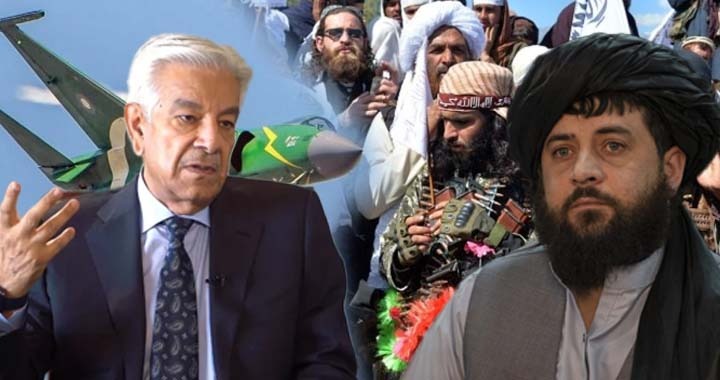Pakistan’s defence minister, after failed, rather the ‘derailed’, Istanbul talks, has issued the sharpest warning yet to the Taliban regime, declaring that Islamabad could “completely destroy the Taliban regime and drive them back to their caves to hide,” adding that Pakistan would not even need to use a fraction of its arsenal to do so. He said a repeat of the Taliban’s flight to the Tora Bora caves would be “spectacular” for the region, referring to the mountain complex that became infamous for sheltering Taliban and al-Qaeda fighters during the early years of the war in Afghanistan.
The minister accused the Taliban of dragging Afghanistan into another war to preserve its rule and sustain a collapsing war economy. He described the “venomous” statements from Taliban officials as proof of a “cunning and disintegrated mentality,” and said Pakistan’s patience had been tested through repeated dialogue attempts. Islamabad, he added, entered the Istanbul talks only at the request of “brotherly countries” that the Taliban had approached for mediation.
Islamabad Demands Action, Kabul Dodges Accountability
After four days of negotiations in Istanbul between Pakistani and Taliban delegations, mediated by Qatar and Türkiye, the process ended without a breakthrough. The two sides met from Saturday to Tuesday, but according to Pakistani officials, the Taliban avoided addressing core concerns, particularly cross-border terrorism and the presence of Tehreek-e-Taliban Pakistan (TTP) and Baloch separatists operating from Afghan soil.
A source close to the Taliban Foreign Ministry told an afghan media outlet that Pakistan demanded Kabul declare the TTP a terrorist organisation and initiate action against its sanctuaries. Islamabad also warned that if Kabul refused, Pakistan would reserve the right to strike “suspicious movements in Afghanistan” following TTP attacks inside Pakistan.
The Taliban delegation maintained that the issue of the Pakistani Taliban is Pakistan’s “internal matter” and insisted that it would not allow Afghan territory to be used to harm any country. The six-member Taliban team included Rahmatullah Najib, Suhail Shaheen, Anas Haqqani, Noor Ahmad Noor, Noor Rahman Nusrat, and Abdul Qahar Balkhi. Pakistan’s seven-member delegation comprised senior diplomats and intelligence officials.
Kabul’s Intentions Exposed
Speaking to reporters at Parliament House after the failed talks, Defence Minister Khawaja Asif said it had become “clear to the mediators what Kabul’s true intentions are.” He warned that Afghanistan was being pushed “back into the past,” and said the Taliban “neither understand the definition of a state, nor possess anyone capable of defining it.”
“If Afghan soil is used for terrorism, Pakistan will respond with full force,” he said. “If our borders are violated, we will strike back. If necessary, we will respond even inside Afghanistan.” He added that the Taliban had “chosen resistance,” and if that was their path, “then so be it.”
From Rhetoric to Real Risk
Responding to the Taliban’s oft-repeated claim that “Afghanistan is the graveyard of empires,” Asif remarked, “Pakistan does not claim to be an empire, but Afghanistan has certainly been the graveyard of its own people.” He warned that the Taliban’s “warmongers” had misread Pakistan’s resolve and vowed that any aggression or cross-border violation would meet a decisive and proportionate response.
The defence minister said the Taliban’s leadership was “beating the drum of war” to preserve their “usurped government and maintain their war economy,” despite knowing that their slogans are hollow. If the Taliban insist on “destroying Afghanistan and its innocent people once again,” he said, “then so be it.”
Diplomacy Gives Way to Deterrence
The collapse of the Istanbul talks and the escalating rhetoric from both sides mark a dangerous new chapter in Pakistan–Taliban relations. Islamabad’s warnings, once framed in diplomatic caution, have hardened into a clear doctrine of deterrence.
With Kabul’s unwillingness to offer written guarantees or take visible action against the TTP, Islamabad’s threat of direct strikes now looms large. The mediators who facilitated the Istanbul dialogue face a delicate challenge: preventing the breakdown from spiralling into open confrontation.
For now, Pakistan’s red line is unmistakable; border violations, cross-border terrorism, or Taliban inaction will no longer be tolerated. And if diplomacy fails again, Islamabad appears ready to let its deterrent speak for itself.





